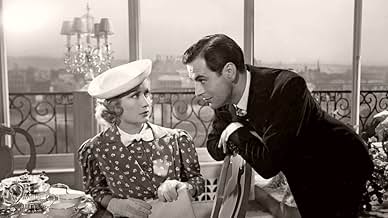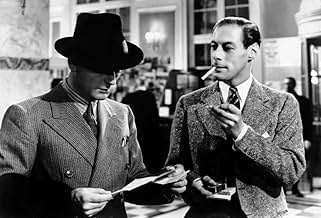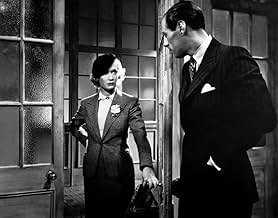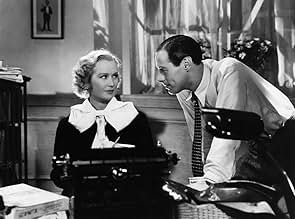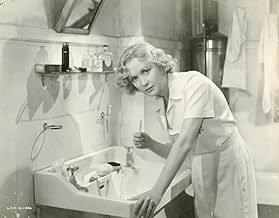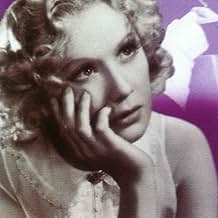Agrega una trama en tu idiomaActor Edmund Davey becomes a star overnight when his wife and co-star teams up with the secretary of a noted stage critic to produce a glowing review of his 'Othello'.Actor Edmund Davey becomes a star overnight when his wife and co-star teams up with the secretary of a noted stage critic to produce a glowing review of his 'Othello'.Actor Edmund Davey becomes a star overnight when his wife and co-star teams up with the secretary of a noted stage critic to produce a glowing review of his 'Othello'.
- Dirección
- Guionistas
- Elenco
Lawrence Grossmith
- Stanley
- (as Laurence Grossmith)
Noël Coward
- Passer-by
- (sin créditos)
Rosamund Greenwood
- Pianist
- (sin créditos)
James Harcourt
- Porter
- (sin créditos)
Michael Hogarth
- Cassio
- (sin créditos)
Noel Howlett
- Cashier
- (sin créditos)
Paddy Morgan
- Kitty
- (sin créditos)
Nicholas Nadejin
- Iago
- (sin créditos)
Opiniones destacadas
Ann is the secretary for a theatre critic...a critic who is about to savage the performance of Edmond Davey as Othello. But something weird (and completely unbelievable) happens...the Mrs. Davey (who plays Desdemona) begs the secretary not to send the article to the printer. While I have no idea why, Ann does something else...she changes the article to make it appear as if the reviewer LOVED Davey's performance! Not surprisingly, Ann loses her job. But then she does something else very strange...she goes to see "Othello" and soon finds herself falling in love with Edmond! Eventually, he begins to feel the same and soon you wonder if the finale of the next production might REALLY result in the death of Desdemona!
There are two main problems with the film. A few performances are a bit shrill--particularly Miriam Hopkins as Ann. Additionally, again and again, the actions of folks (most often but not exclusively Ann) make little sense. For a better take on "Othello", try "A Double Life".
There are two main problems with the film. A few performances are a bit shrill--particularly Miriam Hopkins as Ann. Additionally, again and again, the actions of folks (most often but not exclusively Ann) make little sense. For a better take on "Othello", try "A Double Life".
Very interesting cast in this 1936 British film that predates A DOUBLE LIFE by nearly a decade.
Miriam Hopkins plays a secretary who alters a scathing review of an actor in OTHELLO at his wife's (Gertrude Lawrence) behest. The wife turns out to be correct and the actor (Sebastian Shaw) goes on to become the rage of London's West End. Hopkins then becomes obsessed with the actor and starts going to all the performances of the play. Shaw then become smitten with Hopkins and we get a parallel story of jealousy and rage finally played out on the stage as Shaw's Othello tries to kill Lawrence's Desdemona. All very intriguing and very well played with bits of humor here and there.
Hopkins is, as always, eminently watchable. She was a great actress whose reputation has rather dimmed with the passing decades, but in the 30s she ranked with the top star actresses and was equally at home in drama or comedy. Lawrence is interesting to see in a good role. Not a traditional beauty, but she was a major stage star in her day and she's very good in this film. Shaw is rather bland but does OK with the Shakespearean scenes.
Rex Harrision plays a gawky suitor after Hopkins. A.E. Matthews is very good as the theatre critic. Sybil Grove plays the painter in the park, Laura Smithson is funny as the acid maid, and Val Gielgud (brother to John Gielgud) plays the producer.
But Hopkins is the star. One wonders how she came to star in this British film for Alexander Korda since her Hollywood career was still going strong.
Miriam Hopkins plays a secretary who alters a scathing review of an actor in OTHELLO at his wife's (Gertrude Lawrence) behest. The wife turns out to be correct and the actor (Sebastian Shaw) goes on to become the rage of London's West End. Hopkins then becomes obsessed with the actor and starts going to all the performances of the play. Shaw then become smitten with Hopkins and we get a parallel story of jealousy and rage finally played out on the stage as Shaw's Othello tries to kill Lawrence's Desdemona. All very intriguing and very well played with bits of humor here and there.
Hopkins is, as always, eminently watchable. She was a great actress whose reputation has rather dimmed with the passing decades, but in the 30s she ranked with the top star actresses and was equally at home in drama or comedy. Lawrence is interesting to see in a good role. Not a traditional beauty, but she was a major stage star in her day and she's very good in this film. Shaw is rather bland but does OK with the Shakespearean scenes.
Rex Harrision plays a gawky suitor after Hopkins. A.E. Matthews is very good as the theatre critic. Sybil Grove plays the painter in the park, Laura Smithson is funny as the acid maid, and Val Gielgud (brother to John Gielgud) plays the producer.
But Hopkins is the star. One wonders how she came to star in this British film for Alexander Korda since her Hollywood career was still going strong.
A secretary (Miriam Hopkins) who works for a newspaper alters her theatre critic boss's (A.E. Matthews) review of newcomer Edmond Davey (Sebastian Shaw) in his role as 'Othello' at the behest of the actor's wife (Gertrude Lawrence). She ends up losing her job, but becomes obsessed with the actor and viewing as many performances as she can. He gets to know her and wants a relationship with the woman which leads to near tragic results.
An at times rather muddled melodrama that seems all over the place as it neither knows whether to be a comedy, melodrama, romance or even musical. It would become the model for the later more superior A DOUBLE LIFE (1947). Rex Harrison appears in a rather lively early role ina film produced by Alexander Korda.
An at times rather muddled melodrama that seems all over the place as it neither knows whether to be a comedy, melodrama, romance or even musical. It would become the model for the later more superior A DOUBLE LIFE (1947). Rex Harrison appears in a rather lively early role ina film produced by Alexander Korda.
Men Are Not Gods is a film along the same lines as Ronald Colman's classic Oscar winner A Double Life, an actor who starts really getting into the part of Othello. This production from Alexander Korda is not anywhere near as good as A Double Life.
Miriam Hopkins who works with Rex Harrison at a London newspaper is persuaded by Gertrude Lawrence wife of Sebastian Shaw who are a British version of the Lunts to change the critic's review of her husband's Othello to a rave. Of course that gets her fired and rightly so, but she becomes a fan, the incarnation of the theater going public as Shaw puts it. He starts falling for her, but Lawrence is still very much in the picture.
Starting out as a comedy, Men Are Not Gods should have stayed that way. But the switch to drama is jarring and not really well prepared by the writers. When Colman did A Double Life the whole idea was to show how seriously he prepared for his roles, so much so that they took over his life. Shaw's ready to kill Lawrence for what, a quick roll in the hay with Hopkins?
Rex Harrison has very little to do here, but stand around and alternate between calf eyes at Hopkins and witticisms to the world. The film really made little use of his talents.
See Men Are Not Gods and you'll long for Ronald Colman.
Miriam Hopkins who works with Rex Harrison at a London newspaper is persuaded by Gertrude Lawrence wife of Sebastian Shaw who are a British version of the Lunts to change the critic's review of her husband's Othello to a rave. Of course that gets her fired and rightly so, but she becomes a fan, the incarnation of the theater going public as Shaw puts it. He starts falling for her, but Lawrence is still very much in the picture.
Starting out as a comedy, Men Are Not Gods should have stayed that way. But the switch to drama is jarring and not really well prepared by the writers. When Colman did A Double Life the whole idea was to show how seriously he prepared for his roles, so much so that they took over his life. Shaw's ready to kill Lawrence for what, a quick roll in the hay with Hopkins?
Rex Harrison has very little to do here, but stand around and alternate between calf eyes at Hopkins and witticisms to the world. The film really made little use of his talents.
See Men Are Not Gods and you'll long for Ronald Colman.
This melodramatic affair, with a comedic component prominent in its first half, showcases American Miriam Hopkins amidst an English cast and setting and she performs very well in a role that is not written in a unified fashion. Ann Williams (Hopkins) is personal secretary to Mr. Skeates, caustic theatre critic for the London Daily Post. Skeates has dictated to Ann a very negative review of a new production of Shakespeare's Othello, particularly focussed upon his perceived shortcomings of its titular lead, played by Edmond Davey (Sebastian Shaw). Before Ann has an opportunity for submitting the review to press, she is called on at her office by Barbara Halford (Gertrude Lawrence), the maligned performance's Desdemona and also Davey's wife. As a result of Barbara's entreaties in support of her husband, Ann alters the review causing Davey, who had suffered first-night jitters, to become a great success, after which Ann and he share mutual infatuation with complications ensuing. Director Walter Reisch is responsible for the work's storyline but the screenplay, written by others, falls short of his high standard. His direction is inventive throughout the quickly moving piece, and montage is seamless. Lawrence, a great actress, and Hopkins each displays keen awareness of the importance of body movement and control; there is not a slack moment when these share the screen. Indeed, the acting is quite good by most of the cast throughout, with the exception of the always peculiar Rex Harrison who performs as Ann's suitor with his customary prissy mannerisms; fortunately, his appearance time is minimal. Reisch, in accord with cinematographer Charles Rosher, provides thoroughly interesting visuals by way of cleverly designed shots employing fluid camerawork for tracking and full images as well as for closeups. As stated in the script by Skeates, the music is drawn from themes within the Othello Suite of Samuel Coleridge-Taylor, augmented by a melodic Geoffrey Toye score. In a whimsical scene, Skeates enters his office, populated by a bevy of Daily Post secretaries, while a phonograph plays a jazzy rendition of "Who's Afraid of the Big Bad Wolf?" Vincent Korda's interiors are superb for this production under the aegis of his brother Alexander and the costumes crafted by Rene Hubert are faultlessly designed. Only the age of the available print reveals an editing misstep or two. The highly capable control of extras comes from one of the assistant directors, Jack Clayton, renowned later as helmsman of his own productions. This engaging love triangle features locations scattered through London, including Hyde Park and Trafalgar Square. The footage from Shakespeare's play (the title is from Act III/Scene IV) is shot in the venerable Alhambra Music Hall (now the famous film theatre Odeon) in Leicester Square within London's West End. It was the last performance given at the Alhambra, torn down at the completion of the filming of MEN ARE NOT GODS.
¿Sabías que…?
- TriviaAccording to a studio press book on this movie, the demolition of the Alhambra Theatre was delayed so that it could be used for staging the play "Othello" for this production.
- ErroresThe "goodbye" letter Ann writes to Edmund is not the same one as he is initially shown holding and reading. The words are the same, but the formatting is completely different. After speaking with Tommy, a close-up of the original is seen again.
- Citas
Barbara Halford: [to Edmund] Now, now go and find Ann - and say something nice to her.
- ConexionesReferences Los Tres Cochinitos (1933)
Selecciones populares
Inicia sesión para calificar y agrega a la lista de videos para obtener recomendaciones personalizadas
Detalles
- Fecha de lanzamiento
- País de origen
- Idioma
- También se conoce como
- Triangle
- Locaciones de filmación
- Hyde Park, Westminster, Greater London, Inglaterra, Reino Unido(Ann and Edmund meet near the bandstand)
- Productora
- Ver más créditos de la compañía en IMDbPro
- Tiempo de ejecución1 hora 30 minutos
- Color
- Relación de aspecto
- 1.37 : 1
Contribuir a esta página
Sugiere una edición o agrega el contenido que falta

Principales brechas de datos
By what name was Men Are Not Gods (1936) officially released in Canada in English?
Responda
